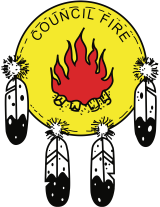In preparation for the re-opening of the Gathering Place, once it is determined that COVID response measures have reached the point where indoor gatherings can safely resume, Council Fire has been developing a new food sharing program, Called “Maamwi-wiis-nidaa”, which translates to sharing our food, the program applies to everything that we do, not just food. It is a commitment to provide services, support, strength and spirit in honour of our culture and our traditions.
To support the program, we are in the process of redeveloping our community kitchen into a professional
grade operation designed to provide training, catering services and the ongoing production of community meals and meals on wheels. Drawings for the new kitchen have been completed and renovations will soon be underway along with the purchase of new appliances. Smaller kitchens in the seniors and youth area will also undergo renovations and upgrades to support the preparation of meals for programs and special events.
Although it is waiting for the completion of the physical upgrades to formerly launch, the spirit of the program and its readiness has already been tested by recent events which called upon the Centres fortitude and compassion. This past month, 200 members from Cat Lake First Nation were forced to evacuate their community due to unsafe fire conditions. They traveled over 2,000 kilometers to Toronto where they received accommodations at the Hilton Airport Garden Inn. Mostly youth and children, it was an offsetting experience for many of them as they had never traveled outside of their remote fly-in community.
To assist with their transition, many agencies including Council Fire, prepared relief packages that were delivered to the strange new environment in which they found themselves isolated. Unfamiliar with the packaged
and processed foods that they were being served, their level of discomfort and dislocation was amplified. To remedy this, Toronto Council Fire prepared a number of traditional meals for them and organized a feast with foods that were familiar to them.
The success of the Maamwi-wiis-nidaa program will also depend on maintaining ongoing partnerships with organization such as Daily Bread Food Bank and Second Harvest. New alliances established during the pandemic and the generosity of groups and individuals such as the Sandwich Sisters have helped to supplement the regular meals that are handed out to community members three times a day. Special event and holiday meals are when the community truly shines and unexpected support comes from sources who want to share food and share a vision for a giving community made up of diverse cultures. Training and employment opportunities created through the Maamwi-wiis-nidaa will build an economic cultural infrastructure that will ensure the longevity of the program and upward mobility for individuals and families looking grow within a culturally supportive environment.
